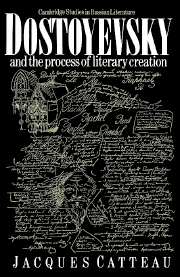Book contents
- Frontmatter
- Contents
- Preface to the English edition
- List of abbreviations
- General editor's note on transliteration and references
- General introduction
- PART I The creative environment
- PART II The process of creation
- Part III Time and space in the world of the novels
- Introduction
- 19 The master of men and hours
- 20 Chronology and temporality in The Idiot
- 21 The ascending spiral
- 22 Time of power and power of time
- 23 The havens of eternity
- 24 The dream of space and the space of the real
- 25 The inventory and the expressionist orchestration of scenery and lighting
- 26 The semantics of colour
- 27 The hero in space: sighting and seeing
- Conclusion
- Notes
- Select bibliography
- Index of names
19 - The master of men and hours
Published online by Cambridge University Press: 18 December 2009
- Frontmatter
- Contents
- Preface to the English edition
- List of abbreviations
- General editor's note on transliteration and references
- General introduction
- PART I The creative environment
- PART II The process of creation
- Part III Time and space in the world of the novels
- Introduction
- 19 The master of men and hours
- 20 Chronology and temporality in The Idiot
- 21 The ascending spiral
- 22 Time of power and power of time
- 23 The havens of eternity
- 24 The dream of space and the space of the real
- 25 The inventory and the expressionist orchestration of scenery and lighting
- 26 The semantics of colour
- 27 The hero in space: sighting and seeing
- Conclusion
- Notes
- Select bibliography
- Index of names
Summary
Dear friend, all theory is grey
And the golden tree of Life is green.
Goethe, FaustThe sovereignty of the writer in the notebooks
Between the notebooks and the novels there is more than the usual distance between the draft and the finished work, the plan and the novel. There is the breath of life which animates the clay bird, the free flight which liberates creature from creator. Bakhtin's polyphonic theory springs from his admiration for the freedom of Dostoyevsky's heroes and it is valuable because he plumbs the depths and discovers the foundations of this freedom. We share some of his conclusions and agree with his analysis of dialogue and speech in Dostoyevsky, but the premises are too absolute and his theory is only true as a tool. Bakhtin was like a member of the audience coming to a theatre just as the actors are improvising in a play by Pirandello. He believed in the illusion of the novel, which he transformed into a theory. But he had not seen the rehearsals, he had not read the technical diary of the author – a good part of his notebooks – questioning himself about composition and human architecture, doubting and hesitant: he had not taken part in the brutal experiments with final gestures: he deliberately ignored the dramatist writing the play with his characters, or slipping into the shadow of the chronicler to become a hagiographer. Bakhtin dealt with the fully grown novel and ignored its making. If he had studied the notebooks, which were not available in 1929, he would have seen that in fact Dostoyevsky was using all his skill to transfer his powers to the hero.
- Type
- Chapter
- Information
- Dostoyevsky and the Process of Literary Creation , pp. 330 - 335Publisher: Cambridge University PressPrint publication year: 1989



